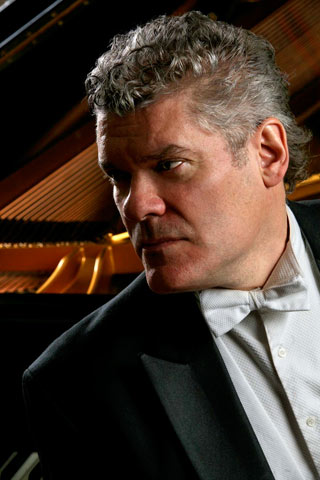Slavic Specialties
by Jan Jezioro

The BPO introduces two new works and rediscovers a neglected sibling
BPO music director JoAnn Falletta returns to the podium at Kleinhans Music Hall for a pair of concerts this weekend, Saturday, May 1 at 8pm and Sunday, May 2 at 2:30pm, in a program featuring works by Tchaikovsky and Josef Suk. Pianist William Wolfram makes a return engagement with the BPO as soloist in Tchaikovsky’s Piano Concerto No. 2 in G major, Op. 44, while Falletta offers the orchestra’s premiere performances of two works, the Fantastic Scherzo and Fairy Tale (Pohádka), by the Czech composer Josef Suk. The performances of the Suk pieces are being recorded for future release on the Naxos CD label.
Sometimes it’s hard to be a younger sibling. Tchaikovsky’s Piano Concerto No. 1 is one of the most popular works in the entire classical music repertoire, and the BPO has programmed it featuring the cream of touring piano soloists 14 times in the orchestra’s 75-year history. The Piano Concerto No. 2 in G Major, Op. 44, on the other hand, has made only one previous appearance, back in 1998, when Claudia Hoca, one of the finest pianists in the Buffalo area, offered a memorable performance of the work. The New York City-based American pianist William Wolfram, who last performed with the BPO in Rachmaninoff’s Rhapsody on a Theme of Paganini in 2006, will give Buffalo audiences another chance to judge the relative merits of the unjustly neglected Piano Concerto No. 2.
A few weeks ago, JoAnn Falletta led a beautifully conceived performance of the Fantasy for Violin and Orchestra in G Minor, Op. 24, with BPO concertmaster Michael Ludwig as soloist; the performance of that 1903 work by Josef Suk (1874-1935) marked the first appearance of any work by the composer on a BPO program. Suk was born in Krecovice, Bohemia, where his father, the director of a chorus, taught him to play the piano, organ, and violin. Entering Prague Conservatory when he was 11, he had composed a mass by the time that he was 14. Suk graduated in 1891, but when Antonin Dvorak became a professor at the conservatory, he stayed on for a year to study with him. Dvorak quickly recognized Suk’s talent, and the two composers developed a life-long friendship, cemented by Suk’s 1898 marriage to Dvorak’s daughter, Otilie. In 1891 Suk, with fellow students from the conservatory, formed the Bohemian Quartet, later known as the Czech Quartet after his country gained its independence in 1918. He continued as the group’s second violin until 1933, repeatedly touring Europe, premiering works by Dvorak and Janacek, among others, while also serving as a professor and eventually head of the conservatory.
Suk’s earlier compositional style was in a late romantic idiom, showing the influence of Dvorak and Brahms, but without making much use of folk music, unlike other Czech composers. Both works on the program, Fairy Tale (Pohádka), Op.16, composed in 1900, a four-movement suite based on Julius Zeyer’s fairytale play Radúz a Mahulena, and the orchestral showpiece, Fantastic Scherzo, Op. 25, composed in 1902-1903, belong to the composer’s first period. The death of Dvorak, Suk’s father-in-law, friend, and mentor, in 1904, followed by the death of his beloved wife Otilie 14 months later, had a devastating effect on the composer. While in mourning for Dvorak, Suk had already composed the first three movements, of a planned five, for the Asrael Symphony, Op. 27, his greatest work, when his young wife died. The composer’s original intention to end the work optimistically was abandoned, and the final two movements were dedicated to the memory of his wife. Suk’s future compositional style changed dramatically, becoming darker and more introspective, utilizing a more modern harmonic language to question the problem of human existence.
For tickets and more information, call 885-5000 or visit www.bpo.org.
blog comments powered by Disqus|
Issue Navigation> Issue Index > v9n17 (week of Thursday, April 29) > Slavic Specialties This Week's Issue • Artvoice Daily • Artvoice TV • Events Calendar • Classifieds |









 Current Issue
Current Issue